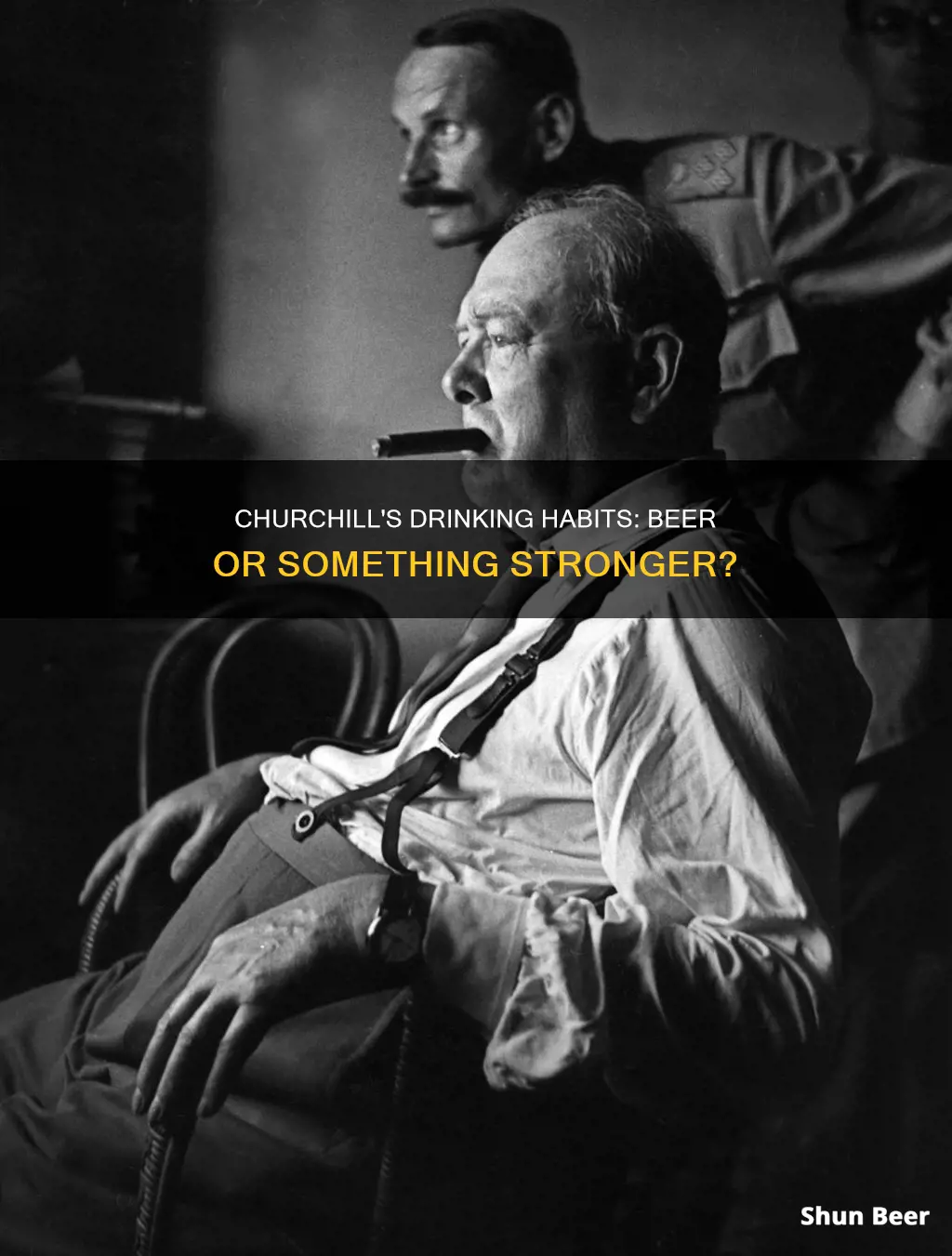
Winston Churchill's drinking habits have been the subject of much fascination and speculation. While it is well-known that Churchill had a penchant for alcohol, the extent and nature of his consumption have been debated. Some sources claim that Churchill drank heavily and had a high tolerance for alcohol, while others suggest that he was an alcoholic or alcohol-dependent.
Churchill's daily routine reportedly included a daily whisky mouthwash in the morning, followed by several drinks throughout the day, including whisky and sodas, champagne or wine at lunch and dinner, and brandies. This consumption pattern is estimated to amount to approximately six glasses of champagne or wine and 5-6 ounces of whisky or brandy over a 12-15 hour period.
Despite his high alcohol intake, Churchill was known for his wit and eloquence, even when intoxicated. He is famously known for his quick comebacks and one-liners, such as his response to a woman who accused him of being drunk: My dear, you are ugly, and what's more, you are disgustingly ugly. But tomorrow I shall be sober and you will still be disgustingly ugly.
Churchill's drinking habits have been a topic of discussion and intrigue, with some questioning whether his consumption affected his decision-making abilities as a leader. However, it is important to note that most historians reject the notion that Churchill was an abuser of alcohol, and he himself reportedly said, I have taken more out of alcohol than alcohol has taken out of me.
| Characteristics | Values |
|---|---|
| Alcohol consumption | Winston Churchill drank a lot of alcohol every day. His daily consumption included several whisky and sodas, an imperial pint of champagne or wine at lunch and dinner, and brandies. |
| Alcoholism | While Churchill drank a lot, there is debate about whether he was an alcoholic. Some sources claim he was alcohol-dependent, while others argue that he was not an alcoholic as he did not show signs of physical or psychological harm, and was highly functional. |
| Drinking habits | Churchill often drank in the mornings, including a daily whisky mouthwash. He also drank during meals and enjoyed champagne, brandy, and whisky. |
| Drinking stories | There are many anecdotes and quotes surrounding Churchill's drinking habits. One famous story involves an exchange with a woman, possibly the Conservative Lady Astor, who accused him of being drunk. Churchill's alleged response was, "My dear, you are ugly, and what's more, you are disgustingly ugly. But tomorrow I shall be sober and you will still be disgustingly ugly." |
| Health | Despite his heavy drinking, Churchill lived to the age of 90. He reportedly had good blood pressure well into his eighties. |
What You'll Learn

Churchill's drinking habits during WWII
Winston Churchill's drinking habits during WWII have been the subject of much fascination and speculation. Churchill was known to have a fondness for alcohol, and his drinking habits have been the subject of much debate, with some arguing that he was an alcoholic, while others claim he was simply a heavy drinker.
Churchill's drinking was not limited to private settings; it was also a notable aspect of his political life and interactions with other world leaders. His visits to the White House during WWII were marked by what White House staffers called "Winston Hours," when Churchill and President Franklin D. Roosevelt would indulge in heavy drinking together. Churchill's affinity for drinking was also noted during his time as a correspondent during the Boer War in 1899, when he brought with him a substantial supply of alcohol, including 36 bottles of wine, 18 bottles of aged scotch, and 6 bottles of vintage brandy.
Despite his reputation for heavy drinking, Churchill maintained that he was not an alcoholic. He believed that his drinking habits did not interfere with his work or cause any significant impairment. Churchill's ability to function effectively despite his alcohol consumption has been a subject of debate, with some arguing that he was a high-functioning alcoholic, while others claim he was simply a heavy drinker who knew his limits.
Churchill himself seemed to encourage the perception of him as a heavy drinker, believing that Europeans appreciated a leader who could hold their liquor. He once famously quipped, "I have taken more out of alcohol than alcohol has taken out of me."
Is Root Beer Safe for 13-Year-Olds to Drink?
You may want to see also

Churchill's alcohol consumption as a young man
Winston Churchill's alcohol consumption as a young man was already quite high. He developed a taste for alcohol as a young soldier posted in what is now Pakistan, where he would add Scotch to his water. He once said:
> When I was younger I made it a rule never to take strong drink before lunch. It is now my rule never to do so before breakfast.
Churchill's cabinets were always stocked with whiskey, claret, and port. In 1936, he reportedly had a tab with his wine merchant that was today's equivalent of $75,000. He would drink whiskey and soda in the morning, and he would put away copious amounts of alcohol at meals.
Churchill's affinity for drinking dated back to when he was a 25-year-old correspondent covering the Boer War for the Morning Post in 1899. When he was sent to the front line, he took 36 bottles of wine, 18 bottles of aged scotch, and six bottles of vintage brandy with him.
Beer and Levofloxacin: Is It Safe to Drink?
You may want to see also

How Churchill's drinking compares to modern drinking habits
Winston Churchill's drinking habits have been the subject of much fascination and speculation over the years. While it is well-known that he had a penchant for alcohol, the extent and nature of his consumption have been debated by historians and experts. When comparing Churchill's drinking habits to modern standards, it is important to consider the cultural and social norms of his time as well as the lack of precise records of his alcohol intake. That being said, here is an analysis of how Churchill's drinking compares to modern drinking habits:
Drinking Frequency and Quantity:
Churchill was known to drink alcohol regularly, often starting his day with a "whisky mouthwash" or a diluted whisky drink. He also enjoyed drinking at mealtimes, with champagne, wine, and brandy being his beverages of choice. While the exact quantity of his alcohol consumption is hard to pinpoint, estimates suggest he drank a significant amount daily. In modern times, such frequent and heavy drinking would typically be associated with alcohol abuse or dependence. However, it is important to note that social norms around alcohol have changed since Churchill's time, and excessive drinking was more accepted in certain social circles back then.
Drinking Culture:
During Churchill's time, particularly in the political and social circles he frequented, drinking was a common and often expected part of social and professional interactions. "Winston Hours" with Franklin Roosevelt and drinking sessions with other world leaders are well-documented. In modern times, while social drinking is still prevalent, there is a greater awareness of the potential harms of excessive alcohol consumption, and drinking to the extent that Churchill did may be viewed as excessive and concerning.
Drinking and Functioning:
One of the most intriguing aspects of Churchill's drinking habits is his ability to function at a high level despite his consumption. He was known for his wit, oratory skills, and decision-making abilities, which did not seem to be significantly impaired by his drinking. In modern times, the impact of alcohol on cognitive function and decision-making is better understood, and heavy drinking coupled with important responsibilities is often frowned upon.
Drinking and Health:
Churchill lived to the age of 90, which may be surprising given his drinking habits. However, it is important to note that individual tolerance to alcohol can vary, and some people may be able to consume larger quantities without experiencing significant health consequences. In modern times, excessive alcohol consumption is generally recognized as a risk factor for various health issues, and heavy drinking is often discouraged for health reasons.
While Winston Churchill's drinking habits may have been considered acceptable or even commonplace during his time, they would likely be viewed differently through the lens of modern drinking culture and our increased understanding of the effects of alcohol. In modern times, his drinking habits might be seen as excessive and potentially harmful, and the social norms and expectations around alcohol consumption have evolved. However, it is important to note that Churchill's drinking did not seem to impede his ability to function at a high level, and he remains an iconic figure in history despite his well-known affinity for alcohol.
Exploring Tybee Beach: Beer and Drinking Laws
You may want to see also

The drinks Churchill preferred
Winston Churchill was known for his love of alcohol, and his drinking habits have been the subject of much discussion and speculation. While some have claimed that he was an alcoholic, most historians reject this label, arguing that he was a heavy drinker but not an abuser of alcohol. Here is a breakdown of the drinks Churchill was known to enjoy:
Whisky
Churchill was known to start his day with a "daily whisky mouthwash," which was often heavily diluted. He typically drank whisky and sodas (with less than an ounce of whisky) around 11 am, teatime, and bedtime, and occasionally one other time during the evening. He never drank whisky neat and often remarked to those who did, "you are not likely to live a long life if you drink it like that."
Champagne
Champagne was Churchill's drink of choice, and he is estimated to have consumed 42,000 bottles of Pol Roger champagne during his lifetime. He believed that Europeans appreciated a leader who could hold his liquor, and he often drank champagne at lunch and dinner, sometimes accompanied by brandy. He famously quipped, "In success, you deserve it, and in defeat, you need it."
Wine
Churchill also enjoyed wine, particularly claret and port. He is known to have stocked his cabinets with wine and often drank wine at meals. On one occasion, he served turtle soup and wine to President Roosevelt.
Brandy
Brandy was another drink Churchill was fond of, especially after meals. He is reported to have said, "I neither want it [brandy] nor need it, but I should think it pretty hazardous to interfere with the ineradicable habit of a lifetime."
Cocktails
Churchill was not a fan of cocktails and rarely drank them. However, to mark his 90th birthday, a special cocktail called the Blenheim was invented by Joe Gilmore, one of the longest-serving barmen at The Savoy's American Bar.
While Churchill's drinking habits were certainly excessive by today's standards, he did not fit the medical definition of an alcoholic. He was able to function at a high level despite his heavy drinking, and his alcohol consumption did not seem to impair his social or vocational functioning.
Drinking Beer on Siesta Key Beach: What's Allowed?
You may want to see also

The impact of alcohol on Churchill's health
It is well-known that Winston Churchill enjoyed drinking alcohol, and he is often remembered for his witty quotes on the subject. However, the impact of alcohol on his health is a more complex question. While Churchill undoubtedly consumed significant amounts of alcohol throughout his life, there is debate among historians and medical professionals about whether he was an alcoholic or merely alcohol-dependent.
Churchill's daily alcohol intake was certainly substantial. He typically started his day with a "daily whisky mouthwash," followed by several whisky and sodas throughout the day, a bottle of champagne or wine at lunch and dinner, and brandies. This amounted to approximately six glasses of champagne or wine and 5-6 ounces of whisky or brandy over a 12-15 hour period. By any standard, this is a large quantity of alcohol.
However, some argue that Churchill's high tolerance for alcohol and his ability to function at a high level despite his drinking habits suggest that he was not an alcoholic. Churchill himself quipped, "I have taken more out of alcohol than alcohol has taken out of me." He maintained this level of consumption throughout his life and did not appear to suffer any significant physical or psychological harm as a direct result. He lived to the age of 90 and remained active and productive until the end, with no apparent negative impact on his social or vocational functioning.
On the other hand, some medical professionals have argued that Churchill's drinking habits did have a detrimental effect on his health. John H. Mather MD, who spent a decade researching Churchill's medical history, described him as "alcohol dependent." Mather noted that a doctor who attended to Churchill after he was knocked down by a car in New York in 1931 issued a medical note specifying that Churchill's convalescence "necessitates the use of alcoholic spirits, especially at mealtimes." This suggests that Churchill's body had become accustomed to regular alcohol intake and may have experienced negative effects without it.
Additionally, Churchill's drinking habits could have contributed to certain physical maladies as he aged. However, it is challenging to determine the exact impact of alcohol on his health, as he also had other risk factors, such as smoking cigars and the stress of his political career.
In conclusion, while Churchill's alcohol consumption was notable, the exact impact on his health is a matter of debate. He did not exhibit many of the typical signs of alcoholism, such as impaired social or vocational functioning, but his body's dependence on alcohol may have had negative consequences for his health, especially in later years. Ultimately, Churchill's ability to function at a high level despite his drinking habits remains a fascinating aspect of his life, one that continues to intrigue historians and medical professionals alike.
Drinking Beer in a Moving Car: What's Allowed for Passengers?
You may want to see also
Frequently asked questions
There is no evidence that Churchill drank beer. However, he was known to drink whiskey, wine, champagne, and brandy.
Churchill drank a lot of alcohol, but there is debate about whether he was an alcoholic. One estimate of his daily alcohol consumption includes:
- Several whisky and sodas (less than an ounce of whisky) around 11 am, teatime, and bedtime, and occasionally one other during the evening.
- An imperial pint (20 oz) of champagne or wine at a 1 pm lunch followed by a brandy, also likely an ounce.
- An imperial pint of champagne or wine at dinner followed by a brandy.
This translates to approximately six glasses (or 1.5 750 ml bottles) of champagne or wine daily, along with 5 to 6 ounces of whisky or brandy spread over a 12 to 15-hour period.
There is some evidence that Churchill tried to cut down on his drinking. For example, in 1936, he apparently won a bet with a friend to abstain from spirits for a year. He also once said, "Everything in moderation." However, his "limit of moderation" was quite high.
There is no consensus on whether Churchill's drinking interfered with his work or public appearances. While some sources claim that he was rarely drunk, others suggest that he was often intoxicated. For example, there are anecdotes of Churchill being witty and quick-tongued while drunk, such as his famous response to a woman (possibly the Conservative Lady Astor) who accused him of being drunk:
> "You, Mr Churchill, are drunk."
> "My dear, you are ugly, and what’s more, you are disgustingly ugly. But tomorrow I shall be sober and you will still be disgustingly ugly."







